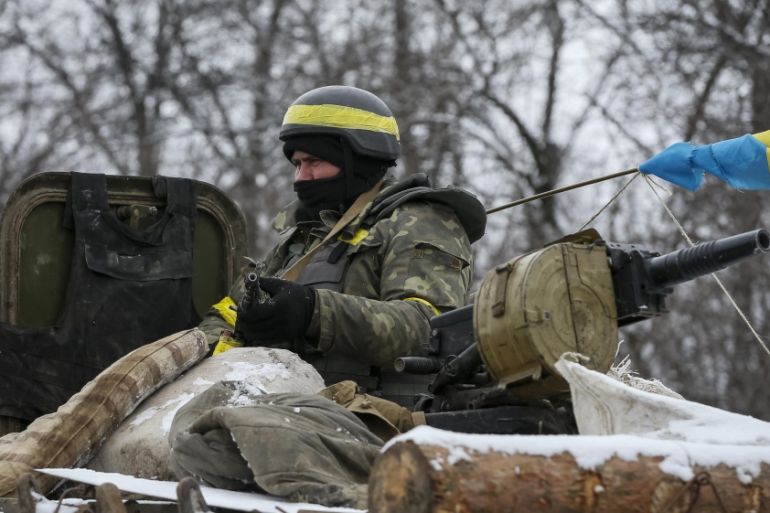Ukraine is more complicated than it sounds
Hawks may howl, but there is no appetite in the US for another foreign adventure in Ukraine.

Amid all the summit diplomacy about Ukraine, including the Merkel-Obama summit in Washington, it is important to keep things in proper perspective.
The battle between the transatlantic partners over whether or not to arm Ukraine “defensively” is eerily reminiscent of the dispute in early 2003 when the US government moved to wage war against Iraq.
It provides no comfort that then Secretary of State Colin Powell delivered on February 5, 2003, his now infamous, dishonest, if not deliberately misleading talk at the United Nations about Iraq’s failure to disarm – almost exactly 12 years ago.
As Congressional voices in Washington are once again beating the drums of war, here are five key considerations that point to the need for broader minded thinking in the US capital.
The conduct of international relations at any time, but especially in moments of real tensions with real adversaries, is akin to engaging in a game of three-dimensional chess.
|
|
That’s why it is worrisome that the hawks’ camp in Washington – with Ukraine now as with Iraq then – tries to reduce it all to a one-dimensional chess game. In any game of chess, never mind one against Russia, that is a self-defeating “strategy”.
Worse, as with Vietnam in the 1960s, the US advocates of military steps in Ukraine seem to be thinking only one step ahead. Other than wishful thinking, there is little analysis of what happens after defensive weapons are delivered.
Don’t be monomaniacal
As in Iraq back then, so it is in Ukraine now; there are about a hundred important questions that have to be asked about Ukraine and its future. The question of whether it should be armed with help from the West is one of many, but certainly far from the most important. And it is far from the only one.
Such an ultra-reductionist, monomaniacal approach – reminiscent of the WMD issue in 2003 – is obviously designed to generate national “will” for action. But this can easily have tragic consequences for US interests and geopolitical stability.
Fierce rhetorical grandstanding does not serve US interests well. It not only constrains the diplomatic manoeuvring space. It also obscures the reality that almost nothing in the real world is black and white. Almost everything is a choice among different shades of grey. That is a reality that war hawks cannot cope with.
Show me the strategy
Ukraine suffers from many self-inflicted weaknesses. That its military will always be smaller than the Russian military is not really one of them. That’s a fact of life – and will always be so.
Ukraine suffers from many self-inflicted weaknesses. That its military will always be smaller than the Russian military is not really one of them. That's a fact of life - and will always be so.
What Ukraine really needs to focus on is to lay the groundwork for a better future for itself. That means putting an end to the still rampant corruption, as well as serious administrative and economic reforms. That is the only thing that will make a real difference for young Ukrainians and their future. Without reforming the state, military success is unlikely anyway.
And yet, a quarter century after independence, the best that can be said is that a still rather feeble effort at such reforms is being made. There is a serious risk that the focus on the military conflict with Russia will delay and distract from any effective implementation of it even further.
Despite their fierce military conflict, Russia and Ukraine are very similar in terms of the dishonesty that has prevailed in their respective political and administrative structures for decades.
The US, whose history underscores the importance of having properly set up institutions as a facilitator of economic development, ought to advocate strongly in that direction. But that focus is getting lost.
Economic realism
There is lip service being paid to the vast financial needs of keeping Ukraine from collapsing – to the tune of at least $50bn as soon as possible.
Aside from the inconvenient fact that nobody is willing to offer up anywhere near that kind of money, Ukraine needs to find a political and economic modus vivendi with Russia that is not rooted in military approaches – an issue area in which Ukraine, by definition, will always come up short.
Ukraine is a country with precious few assets – and tremendous resource needs. Hard as that is, that requires the Ukrainian leadership to make some very hard choices.
Getting high on hawkish signals sent out by some in Washington about a military fight with Russia isn’t something that Petro Poroshenko can actually take to the bank.
Strategic patience
There is one pivotal difference between 2003 and 2015. All indications are that the Obama team, with its just announced National Security Strategy aimed at practising “strategic patience” is actually cut out of the same cloth as Germany’s Angela Merkel.
Indeed, there may be few global leaders who are using the concept of “strategic patience” more aggressively than Merkel.
Her opposition to military action in Ukraine in Europe matters greatly. It also offers Obama a shield in the debate within the US. Hawks in Washington may howl, but there is next to no appetite among the American people to get into another foreign adventure.
Stephan Richter is publisher and editor-in-chief of theglobalist.com and is president of the Globalist Research Center.
The views expressed in this article are the author’s own and do not necessarily reflect Al Jazeera’s editorial policy.
